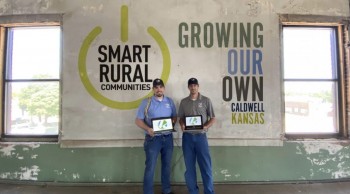There has likely never been a more valuable time to celebrate those NTCA members who have worked to hard to create Smart Rural Communities where they live, work and play. This is evident in the work of this year’s Smart Rural Communities (SRC) grant recipients.
SRC, an initiative of NTCA-The Rural Broadband Association, promotes collaboration among broadband providers and other local leaders to leverage broadband-enabled solutions to generate innovative economic development, education, health care, public safety and other timely and critical solutions for rural areas. This year, SRC proudly awarded grants for four projects in rural regions across the United States.
KanOkla Telephone Association (Caldwell, Kan.) is creating a learning lab for a regional workforce alliance and college for advanced tech resources. The space will feature Gigabit broadband and enable students to work both wirelessly and hardwired. The long-range goal of the project is to foster entrepreneurism and improve regional economic health. This project recognizes the need for a regional approach to rural issues as well as an innovative step to encourage local talent. What a great way to combine the value of that robust network with the next generation of businesses that our economy so desperately needs right now.
Education is also on the mind of West Kentucky and Tennessee Telecommunications Cooperative (WK&T) (Mayfield, KY), which will apply its SRC grant to support broadband access points in a new $12 million local library. In a county with nearly 20 percent population below the poverty line and nearly a third without home internet access at their home, the WK&T project aims to enable students and adults access to vast online resources. This is particularly important in a community where students represent about 20 percent of the local population. It will be ready when the library is ready to be the robust hub in the community once again.
In middle Tennessee, DeKalb Telephone Cooperative (DTC) (DeKalb, Tenn.) is turning to IoT to provide easier and more secure access to the county agricultural center. The public space hosts community events as well as job training workshops and local trade meetings, covering industries as diverse as cattle and roofing. DTC will combine the SRC grant with matching community funds to implement smart locks and security systems that in the first year alone will more than pay for itself in saved administrative and security costs. The broadband-enabled application also supports an audit trail that enables mangers to track all entry and exit from the center. I would imagine that this start down the IoT road will lead to a number of ideas and applications that will run parallel to this application and bring even more ideas on ways for DTC to partner with their community.
And in Oregon, DirectLink (Canby, Ore.) is working with city planners to implement 24-hour Wi-Fi in city parks. The parks collectively attract more than 75,000 users annually. The secure platform will promote city and community events and is intended to support tourism and local industry. These tools will be a huge assistance to helping rural tourist areas ramp back up again for visitors. Matching funds, as required for all SRC grants, are provided by the city which is installing power systems and financing the ongoing costs of the 100 Mbps subscription fee.
Smart locks; maker spaces; libraries; public Wi-Fi. All seem deceptively simple, yet all are the roadmap on how broadband is the lynchpin to increase achievement, opportunity and economic gains for rural communities at a time when rural America has an opening to pitch the value of folks moving out of dense urban centers. Smart Rural Communities have the opportunity to empower that rural movement and rebirth.
And I would be remiss if I didn’t thank NISC, NRTC, Mapcom Systems and PlusOne Strategic Communications for their support of these annual grants!

